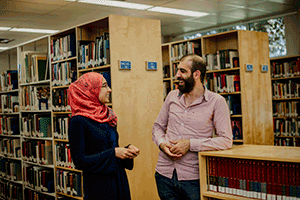Ready to learn more?
Get all the details straight to your inbox!

Living in The Student Village at Luther College, our student residence, comes with a choice of healthy, nutritious meal plans. That means no grocery shopping, no meals to cook, and no dirty dishes to worry about. You can focus on your studies and wellness!

Luther College is a great choice for high school to university transition. Enjoy all the benefits of a larger campus, without feeling lost in the crowd. Our community is full of caring mentors and peers to ensure a positive student experience.

Luther College offers Bundles programs that group together first-year students and classes to give you a great start and help ease the transition from high school to university.

The priority deadline for academic application is March 15. To book a personalized enrolment counselling appointment, contact our Recruitment Office at 1-306-206-2117.

Luther College students are U of R students and receive all the same benefits. Upon graduation you will receive a U of R degree.

Eating better means studying better. The Luther Cafeteria offers fresh, healthy, nutritious meals seven days a week with a self-serve “all-you-care-to-eat” concept students prefer.

Luther College is recognized for its high standards of teaching, focused research, and one-on-one academic advising. We value and protect this heritage of excellence in scholarship, freedom of inquiry, and faithful seeking after truth.

The Luther Library has over 24,000 items in its collection, 5,000 books checked out per year, and 7,000 students who come through its door per month.
Get all the details straight to your inbox!
By Dorothy Lane
…Words strain,
Crack and sometimes break, under the burden,
Under the tension, slip, slide, perish,
Decay with imprecision, will not stay in place,
Will not stay still. Shrieking voices
Scolding, mocking, or merely chattering,
Always assail them. (Eliot 194)
Use your words! This clichéd directive is all too familiar to parents of young children, often uttered when children appear tempted to use their fists or teeth to communicate profound emotion. It is also a fascinating illustration of the argument that words can mask feelings deemed potentially wounding to others; after all, we rarely issue this command if a child is moved to embrace or laugh. When issuing the directive, parents effectively adopt a role of interpreter and social gatekeeper—translating inappropriate emotions into language that softens the blow. Even at a very young age, then, we understand that verbal communication has the power to neutralize potent ideas and feelings, and that we must modify both language and tone to fit our audience and purpose. At the same time, words can be poor instruments of meaningful communication; sometimes there are no words to express our feelings, and yet we continue speaking. As T.S. Eliot suggests in Four Quartets,“shrieking voices” scold, mock, or chatter, thus often assailing the precision and subtlety of language.
The parental role described above also spills into the public sphere. The term “euphemism” refers to words with positive connotations for concepts that are uncomfortable or that carry negative emotion in our society. George Orwell went one step further in coining the term “double-speak” to describe a socially-unpalatable concept that is deliberately couched in positive language by those who adopt the role of gatekeepers and interpreters within our larger social and political contexts. For Orwell, double-speak also allowed those in control to carry on the same old discriminations and inequalities, while pretending that what they had created was a freer, more egalitarian society. At the same time, euphemisms, when they become too familiar, begin to take on the negative connotations of their predecessors, and a new euphemism often rises from the ashes of the old, carrying with it all the sticky negativity of our harmful attitudes and unexamined emotional reactions.
Lori Beaman’s reflection on “reasonable accommodation” and “toleration” touches on that paradoxical power and inadequacy of language; as she notes, Canadian policies related to multiculturalism that incorporate these euphemisms “create a hierarchy or a sedimentation of unequal power relations” (1). However, replacing these words with those of “deep equality”—while perhaps a step towards “a complex understanding of diversity that emphasizes similarity” (2)—does not go far enough in probing the underlying feelings and judgments embedded in ideas of “majority and minority” cultures themselves, and more important, the perspective assumed in any legislation around acceptance or rejection of outsiders. Beaman is right, I believe, to hope for the opening of “space for conversation that involves shared exploration of possibilities” (3), but I am not convinced that this space is feasible within legal and political discourse. Moreover, the conversation would likely include only those voices already granted admission through the gate. I would hope any reflection would examine more deeply the words we use in the context of the history and language of imperialism itself, exposing the tension between our self-characterization as Christian and our legacy as a former colony of the British Empire.
Decades ago, literary scholar and Christian apologist C.S. Lewis unpacked the language of the Book of Common Prayer, responding to repeated attempts to replace language that was increasingly uncomfortable to modern Anglicans. In one case, he focused on removal of the statement to be made in confession that “the burden [of our sins] is intolerable.” He underscored the etymology of the term “intolerable,” which means “unbearable” but is used in several ways: “you say ‘I cannot bear it,’ when you mean it gives you great pain, but you also say ‘that bridge will not bear that truck’—not meaning ‘that bridge will feel pain,’ but ‘if that truck goes on to it, it will break and not be a bridge any longer, but a mass of rubble’” (Lewis). The connotation of the word has thus changed in colloquial use, but if we return to the root we find that “the burden is intolerable” was uttered as a statement of fact rather than emotion, and presumed a broader (divine) perspective on our lives.
What strikes me immediately about the term “toleration” and its equally-used cognate “accommodation” is that they imagine a burden or effort, and that they are spoken from the position of the cultural mainstream to an imaginary outsider or other. “Toleration” presumes that the outsider potentially burdens mainstream culture—though the burden is perhaps still “tolerable”—while “accommodation” presumes that the mainstream culture is a coherent and intact jigsaw puzzle (mosaic) requiring adaptation to permit the inclusion of another piece. How would our language and thinking change if we perceived our own traditions and behaviours as burdensome, or if we recognized that the puzzle is itself under construction and we are limited in our ability to envision a coherent picture? Setting aside the emotional content of language such as “I can’t stand it” or “the emerging picture sickens me,” can we honestly say that Canada will collapse—like a worn-out bridge—with the weight of practices and traditions outside the gates? Perhaps the puzzle is a magnificent work-in-progress that no one citizen can imagine or define.
In order to understand the full range of meanings conveyed—carried or borne—by words such as “toleration” and “accommodation,” we also have to acknowledge how these terms carry the sticky negativity of Canada’s own colonial heritage. There are multiple problems with terms such as accommodation and toleration, related to their presumption of a unified, dominant perspective, and confusion between emotional and rational content of such words. As scholars such as Homi Bhabha have long noted, the tongue of the colonizer is already forked in the sense that it demonstrates facility in saying two things simultaneously, or saying one thing and doing another. The fissures within the monolithic “mainstream” are multiple; it is only when faced with a presumed external threat that the verbal weapons of “Christian Canada” are wielded. Before we voice that identity with certainty, we also need to examine our actions and emotions to ensure they are consistent with the values we claim to espouse in words.
Imperialism, and particularly the British Empire, is all too familiar with the facility of language to enable or mask inequality and coercion. One of the cleverest examples of new euphemisms replacing old was the abolition of “slavery” of Africans in the 19th century, and its subsequent replacement with “indentured service” relying particularly on emigrants from South Asia; indentured labour was presented as a solution to economic problems faced by colonialists after the emancipation of slaves, but it brought many problems of its own, such as widespread unemployment of freed slaves, tensions between former slaves and Asian emigrants, and eventually fears that these emigrants would stay on in the colonies indefinitely. Telling her own family’s story, Minal Hajratwala focuses on the Indian diaspora in multiple regions of the Empire; indentured labour began as an “elegant solution” (48) to problems of overpopulation in India and the need for cheap labour in the colonies.
In South Africa, the “mainstream” (minority) of European descent began to fear the increasing power of these “servants,” and since the Empire maintained its official opposition to racial discrimination—and its policy that subjects of the Empire should have free passage throughout the colonized world—it required a sleight of hand (or language) to limit entry of Asian immigrants. Rather than explicitly limiting immigration of certain racial or ethnic groups, South Africa imposed “literacy tests” that required—at the discretion of immigration officers—potential immigrants to answer certain questions in writing, in a European language (49). It was, however, the discretion of the officer that gave teeth to this seemingly inoffensive law; officers could discriminate on the basis of appearance, and even a highly-educated person could be denied entrance if he or she were unable to give a written answer in a European language. It was iterated even more problematically in Australia, where immigrants were required to take dictation “in any prescribed language…in the presence of the officer” if asked to do so (49). Hajratwala notes that “Asian immigrants were asked at the docks to take dictation in Dutch, in German, in Portuguese by officers who laughed at their confusion. Similar non-discriminatory discriminations spread to New Zealand, Canada, other parts of Africa. The United States … unbound by British civility and economic interests … opted to simply exclude all Asians” (49).
Current debates regarding “accommodation” and “toleration” in multicultural Canada sound remarkably similar, characterized by economic interest and the desire to appear polite. Public discourse tends to alternate unimaginatively between models of assimilation and segregation, never penetrating the surface concepts or how much of their currency is emotional and how much is truly “reasonable.” The pattern of employing euphemism and “non-discriminatory discrimination” is consistent with our inheritance as a dominion of Britain from the 19th century, though we tend to overlook the striking link between our own attitudes and governance models, and those of other areas of the former Empire. The profound emotion often concealed in polite language is fear: fear of the other and simultaneous fear of our need for the other. Two generations ago, euphemisms such as “separate but equal” and “apartheid”—in English an innocuous-sounding “apartness”—were imbedded in legislations throughout the Empire; Canada established reserves to contain First Nations populations, and South Africa drew on that idea in establishing homelands for black Africans. It is worth noting that both “reserve” and “homeland” are euphemisms that needed to be replaced with terms such as “separate development” and “group areas” legislations. The apparently-logical basis to segregation was the concept that ethnic groups could cohabit more peacefully if contained by geographical boundaries; as Hajratwala notes, though, these groups “did not begin on equal terms, nor did they have an equal capacity to assert their desires. In South Africa, as perhaps elsewhere, ‘get along better’ was code for ‘serve white interests better.’ And ‘separate’ was a euphemism for cruelly, desperately unequal” (72). Canadians today speak in favour of cultural and literacy tests, raising concerns regarding the costs of immigrants on our health-care system. At the same time, Canada has actively encouraged immigration of target groups, and international students who later seek employment, as a way of boost the economy.
Which brings me to Beaman’s proposed new language of “shared exploration” and “deep equality.” Her vision is refreshing, particularly as it shifts the perspective from “us/them” to “we.” More exciting is the proposal that the mainstream relinquish its assumed role of interpreter and gatekeeper; but I wonder about the practicability of this language in public policy or legislation. Even “accommodation,” for instance—as it was employed in models of Christian instruction—placed the onus on the teacher to accommodate complex theological or philosophical principles to an audience that might be incapable of understanding them. The possibility that the picture itself might be radically altered through “shared exploration” is frightening to many Canadians. What language would we use in such a conversation? I am frankly tempted to think that there are—and perhaps should be—no words in English strong enough to convey the complexity of respect for difference and sharing of space. If anything, the Sanskrit concept of ahimsa, poorly translated as “non-violence,” seems closer to voicing a transformation in perspective. The point often missed in English translations is that violence results from seeing the other as “other” in the first place, while ahimsa seeks to view all human beings as infinite and unlimited: “If one limits one’s neighbor, one limits oneself. Ahimsa opposes any language of segregation, it calls upon us always to see the common behind the divisive. As a result, Ahimsa could protect humans against manipulation through fictive identities, whether of a national, ethnic or cultural character” (Trojanow 100). Similarly, the Bantu term ubuntu underscores a comparable complex perspective balancing respect for diversity, acknowledgement of power differences, and common ground shared by members of a particular community: “I am who I am because of who we all are.” It is no accident, in my view, that some of our greatest visionaries and social reformers in the past century—including Gandhi, Martin Luther King, Desmond Tutu—have turned to ancient concepts in the vernacular rather than translation into English.
It might be even more surprising to those who adopt a perspective of unified Christian Canada that a comparable principle of perceiving our liberation as bound up in the liberation of the oppressed is articulated in the Anglican baptismal covenant; in that covenant, one promises to “strive for justice and peace among all people, and [to] respect the dignity of every human being” (159). Note that this covenant casts a wide net to “seek and serve Christ in all persons” (159), rather than focusing primarily on “people like us.” The concepts are remarkably similar to non-Christian concepts of ahimsa and ubuntu, yet we seldom reflect on them. Returning to Lewis’s article on the language of the Book of Common Prayer, “When people begin to find the words of our service difficult to join in, that is of course a sign that we do not feel about those things exactly as our ancestors. Many people have, as their immediate reaction to that situation the simple remedy –‘Well, change the words’—which would be very sensible if you knew that we are right and our ancestors were wrong. It is always at least worth while to find out who it is that is wrong.” That investigation is exactly what we should be undertaking at this time, challenging ourselves to review the words and motivations of our ancestors, and mindfully determining what is wrong with the language.
An additional challenge, as Beaman accurately notes, is living out any radical shift in perspective rather than simply creating a new euphemism to mask the old ways of segregation or assimilation; as she states, equality can easily swing towards forced sameness, and even concepts of ahimsa and ubuntu have been uneasily integrated into policy and legal practice in India and South Africa. Words are “slippery” but we need to respect and take responsibility for their ability to initiate action in law and politics; Canadian writer Gary Geddes notes that “Language, like politics, is an unstable medium; it’s dirty with sound, with secondary meaning and with unexpected connotations that come zinging in from the side to torpedo the best of intentions” (204). But language in the hands of those who acknowledge its limitations and its power can be “where we start” (Eliot 204); in the hands, for instance, of writers Geddes cites in sub-Saharan Africa, language can “have the power to touch what is broken in us, to mend what is damaged…the place of damage is also the place of power” (203). In the hands of political or legal agents seeking to justify emotions of fear and anger, it can serve as “a step to the block, to the fire, down the sea’s throat / Or to an illegible stone” (Eliot 221). Perhaps it is not yet the occasion to speak, then, but instead to listen and truly hear even the uncomfortable words of our neighbours—to relinquish our roles as interpreters and gatekeepers, and use our own words to ask questions. The legal implications of words, even the most innocuous euphemisms, can indeed harm if not accompanied by self-examination, humility, and openness. It may not be an external threat that breaks us, but our own uncomfortable emotions and unacknowledged past, and our fear that the picture emerging is gloriously beyond our control.
Beaman, Lori. “Deep Equality: Moving Beyond Tolerance and Accommodation.” The Book of Alternative Services of the Anglican Church of Canada. Toronto: Anglican Book Centre, 1985.
Eliot, T.S. Collected Poems 1909-1962. London: Faber and Faber, 1963.
Geddes, Gary. Drink the Bitter Root: A Writer’s Search for Justice and Redemption in Africa. Vancouver: Douglas and McIntyre, 2011.
Hajratwala, Minal. Leaving India: My Family’s Journey from Five Villages to Five Continents. Boston: Houghton Miffin Harcourt, 2009.
Lewis, C.S. “Miserable Offenders: A Reflection on Prayer Book Language.”http://anglicanhistory.org/usa/advent/misoff.html
Trojanow, Iliya. Along the Ganges. London: Haus, 2005.